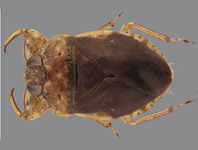Abstract
Nippostrongylus smalesae sp. nov. (Nematoda: Heligmonellidae) is described from a murid Maxomys whiteheadi collected in Riau, Sumatra, Indonesia. It is readily distinguished from all of the known congeners by having the ray 3 widely diverged distally from the ray 4 in the left lobe of bursa copulatrix. This is the tenth named species of Nippostrongylus. The same species but with slight morphological difference was also found from M. whiteheadi and Niviventer cremoriventer in Kalimantan (Borneo Island), suggesting wide geographical distribution on the Sundashelf islands.
References
Achmadi, A.S., Esselstyn, J.A., Rowe, K.C., Maryanto, I. & Abdullah, M.T. (2013) Phylogeny, diversity, and biogeography of Southeast Asian spiny rats (Maxomys). Journal of Mammalogy, 94 (6), 1412–1423.
https://doi.org/10.1644/13-MAMM-A-092.1
Beveridge, I. & Durette-Desset, M.C. (1992) The morphology of Nippostrongylus magnus, a parasite of native Australian rodents. Transactions of the Royal Society of South Australia, 116 (3), 109–115.
Chaisiri, K., Chaeychomsri, W., Siruntawineti, J., Ribas, A., Herbreteau, V. & Morand, S. (2010) Gastrointestinal helminth infections in Asian house rats (Rattus tanezumi) from northern and northeastern Thailand. Journal of Tropical Medicine and Parasitology, 33 (1), 29–35.
Chaisiri, K., Chou, M., Siew, C.C. & Morand, S. (2016) Gastrointestinal helminth fauna of rodents from Cambodia: emphasizing the community ecology of host-parasite associations. Journal of Helminthology, 1–13. [published online 1 December 2016]
https://doi.org/10.1017/S0022149X16000869
Chabaud, A.G. & Desset, M.C. (1966) Nippostrongylus rauschi n. sp. nématode parasite de dermoptères et considerations sur N. brasiliensis parasite cosmopolite des rats domestiques. Annales de Parasitologie Humaine et Comparée, 41 (3), 234–249.
Dewi, K., Hasegawa, H. & Asakawa, M. (2016) A review of the genus Syphacia (Nematoda: Oxyuridae) from murine rodents in Southeast Asia to Australia with special reference to Indonesia. Treubia, 43, 79–104.
Dewi, K., Hasegawa, H., Fitriana, Y.S. & Asakawa, M. (2015) Syphacia (Syphacia) maxomyos sp. n. (Nematoda: Oxyuridae) from Maxomys spp. (Rodentia: Muridae) from Sulawesi and Sumatra, Indonesia. Journal of Veterinary Medical Science, 77 (10), 1217–1222.
https://doi.org/10.1292/jvms.14-0659
Durette-Desset, M.C. (1970) Le genre Nippostrongylus Lane, 1923 (Nématode-Héligmosomatide). Annales de Parasitologie Humaine et Comparée, 45 (6), 815–821.
Durette-Desset, M.C. (1983) No. 10. Keys to genera of the superfamily Trichostrongyloidea. In: Anderson, R.C. & Chabaud, A.G. (Eds.), CIH Keys to the Nematode Parasites of Vertebrates. Commonwealth Agricultural Bureaux, Farnham Royal, Buckinghamshire, pp. 1–86.
Greenberg, Z. (1972) Helminths of birds and mammals from Israel. IV. Helminths from Nesokia indica Gray & Hardwicke, 1832 (Rodentia: Muridae). Israel Journal of Zoology, 21 (2), 63–70.
Hasegawa, H. (1990) Nematodes of the family Heligmonellidae (Trichostrongyloidea) collected from rodents of the Ryukyu Archipelago and Taiwan. Journal of Parasitology, 76 (4), 470–480.
https://doi.org/10.2307/3282824Hasegawa, H. (1999) Phylogeny, host-parasite relationship and zoogeography. Korean Journal of Parasitology, 37, 197–213.
https://doi.org/10.3347/kjp.1999.37.4.197
Hasegawa, H. & Syafruddin (1994) Hasanuddinia maxomyos n. gen., n. sp. and Heligmonoides musseri n. sp. (Nematoda: Heligmonellidae) collected from endemic murines of Sulawesi, Indonesia. Journal of Parasitology, 80 (5), 781–788.
https://doi.org/10.2307/3283258Hasegawa, H. & Syafruddin (1995) Nippostrongylus marhaeniae sp. n. and other nematodes collected from Rattus cf. morotaiensis in North Halmahera, Molucca Islands, Indonesia. Journal of the Helminthological Society of Washington, 62 (2), 111–116.
Hasegawa, H. & Syafruddin (1997) Maxomystrongylus yasumai gen. and sp. n. (Nematoda: Trichostrongylina: Heligmonellidae) collected from murid rodents in Kalimantan, Indonesia. Journal of the Helminthological Society of Washington, 64 (2), 263–268.
Hasegawa, H. & Tarore, D. (1995) Nippostrongylus sembeli, new species (Nematoda: Heligmonellidae) collected from Rattus xanthurus of North Sulawesi, Indonesia. Raffles Bulletin of Zoology, 43 (2), 337–342.
Mawson, P.M. (1961) Trichostrongyles from rodents in Queensland with comments on the genus Longistriata (Nematoda: Heligmosomatidae). Australian Journal of Zoology, 9 (5), 791–826.
https://doi.org/10.1071/ZO9610791Musser, G.G. (1981) Results of the Archibold expeditions. No. 105. Notes on systematics of Indo-Malayan murid rodents, and descriptions of new genera and species from Ceylon, Sulawesi, and the Philippines. Bulletin of the American Museum of Natural History, 168 (3), 225–334.
Ow Yang, C.K., Durette-Desset, M.C. & Ohbayashi, M. (1983) Sur les nématodes parasites de rongeurs de Malaisie. II. Les Trichostrongyloidea. Annales de Parasitologie Humaine et Comparée, 58 (5), 467–492.
Palmeirim, M., Bordes, F., Chaisiri, K., Siribat, P., Ribas, A. & Morand, S. (2014) Helminth parasite species richness in rodents from Southeast Asia: role of host species and habitat. Parasitology Research, 113 (10), 3713–3726.
https://doi.org/10.1007/s00436-014-4036-0
Rowe, K.C., Achmadi, A.S. & Esselstyn, J.A. (2016) Repeated evolution of carnivory among Indo-Australian rodents. Evolution, 70 (3), 653–665.
https://doi.org/10.1111/evo.12871
Sathiamurthy, E. & Voris, H.K. (2006) Maps of Holocene sea level transgression and submerged lakes on the Sunda Shelf. Natural History Journal of Chulalongkorn University, 2 (Supplement), 1–43.
Smales, L.R. (2012) Helminth parasites of hydromyine rodents from the island of New Guinea. In: Triunveri, A. & Scalise, D. (Eds.), Rodents. Nova Science Publishers, Inc., New York, pp. 99–117.
Smales, L.R. & Spratt, M.D. (2004) Helminth community structure in Rattus leucopus (Gray) (Muridae) from Australia, Papua New Guinea and Papua. Australian Journal of Zoology, 52 (3), 283–291.
https://doi.org/10.1071/ZO03051
Smales, L.R. & Spratt, M.D. (2008) Helminth assemblages of Uromys spp. (Muridae: Hydromyinae) from Australia, Papua New Guinea and Papua Indonesia and comparison with assemblages in Melomys spp. Australian Journal of Zoology, 56 (2), 85–94.
https://doi.org/10.1071/ZO08011
Tanaka, R., Hino, A., Tsai, I.J., Palomares-Rius, J.E., Yoshida, A., Ogura, Y., Hayashi, T., Maruyama, H. & Kikuchi, T. (2014) Assessment of helminth biodiversity in wild rats using 18S rDNA based metagenomics. PLoS ONE, 9, e110769.
https://doi.org/10.1371/journal.pone.0110769
Voris, H.K. (2000) Maps of Pleistocene sea levels in Southeast Asia: shorelines, river systems and time durations. Journal of Biogeography, 27 (5), 1153–1167.
https://doi.org/10.1046/j.1365-2699.2000.00489.x

